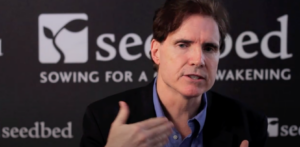Leadership is both a privilege and a choice. To participate at the highest levels in God’s mission of redemption is a high and humbling honor. It is also a choice freely made by those who sense a call from the Lord to step forward; it should never be forced. These ten principles have helped us at Mosaic set a standard for healthy spiritual leadership:
- A personal, living relationship with Jesus Christ. This goes beyond a mental assent to a set of principles. This is about a personal connection with God that is transformational and liberating. Without this kind of faith, we would be setting people up for failure at best, spiritual attack at worst.
- A fervent commitment to prayer. Intercede regularly for the ministry, people and leaders. Spiritual leaders are not afraid to lead in prayer, and would not consider starting a meeting or leading a ministry without saturating it in prayer. Spiritual leaders understand and engage in spiritual warfare.
- An enthusiastic commitment to being here. Spiritual leadership requires a commitment to the vision throughout the life of the church, not just in your ministry area. This includes a commitment to small group membership, as well as attendance at any leadership gathering or important meeting of the church.
- A joyful commitment to giving. The Christian life stresses the importance of investing in the community that feeds you. Solid Christian leadership also stresses the importance of good modeling. People want to know that if you’re standing before them as a leader, you are invested in the life of the church in the same way they are. They should not be expected to trust the leadership of someone who is not sacrificing in the same ways they are, nor should they be expected to allow you to make decisions on their behalf if you are not invested.
- A humble commitment to serving. This means not only serving where you are appointed, but making time to serve where you are called by the gospel to join in — particularly service to the poor.
- A radical commitment to the Great Commission. This means a willingness not only to see the church winning people to Christ, but a personal desire to share your faith story and invite people into a saving relationship with Jesus.
- A healthy commitment to practicing emotional intelligence. This means open, direct and honest communication; a willingness to ask clarifying questions and accept constructive coaching; an absolute commitment to grace; and a refusal to feed any spirit of offense. It means being willing to deal honestly with your own brokenness. It means being willing to approach people immediately when conflict arises, placing a high value on reconciliation and an absolute trust in the principles of Matthew 18:15-20.
- A transparent commitment to loyalty. In both speech and action. Leadership is for those who are committed to both the vision and the team. If you’re not, then my question would not only be, “Why are you in leadership?” but also, “Why have you chosen this place for your spiritual care and feeding?” Because life is too short to serve someplace where you’re not all in.
- An educated commitment to an orthodox, evangelical expression of the gospel of Jesus Christ. Understand our theology so you can support our message and care well for those exploring the faith.
- An unwavering commitment to excellence. No one person comes into leadership fully equipped. A continual commitment to education and training is critical for the leadership of a growing community. If we are going to stay on the leading edge of God’s movement, we need leaders who understand what God is doing in the world today and who are enthusiastic about joining Him in that work.
This is our list. What is yours? What matters to you in a leader? Having a clear vision and standards for healthy leadership is a prime way we can battle against the usual accusations about what it means to be “church.” Shoot for excellence so the Holy Spirit has room to work.








